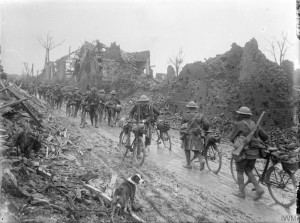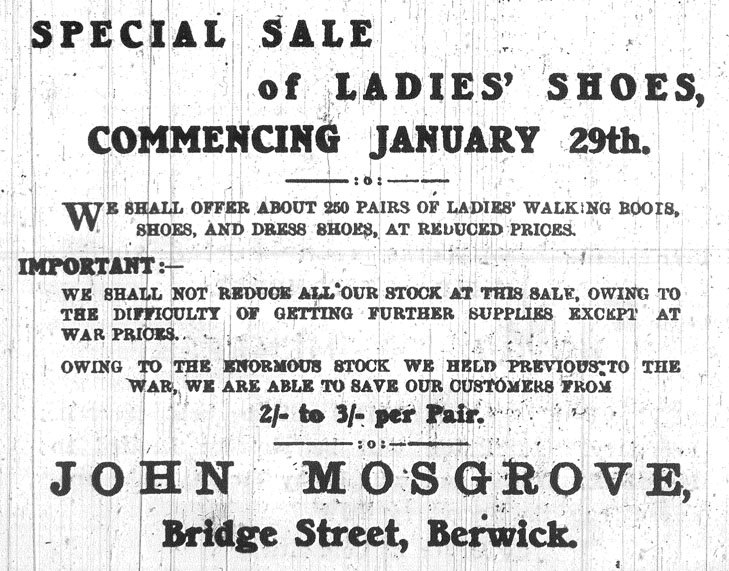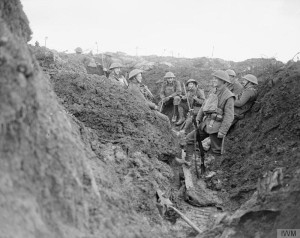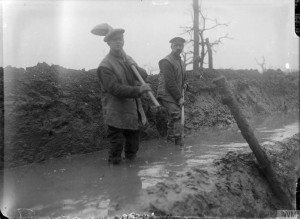22 JANUARY 1915
SERGEANT CYCLIST WRITES TO BERWICK
Writing from the front to a friend in Berwick; Sergeant. T. Young, Army Cycling Corps, 7th Division, says: -“We sailed from Southampton for ———– on Christmas Eve and I can tell you we were fairly miserable to see the lights of the Old Country fade away and thinking of our friends at home. We arrived at a rest camp at ——— about 3.00 p.m. on Christmas Day, tired, hungry and very cold.
Three miserable days were spent then we departed for the front by train, the journey taking 30 hours. We arrived at a place called Railhead and then had an hour’s cycle run to our billet,-a deserted farmhouse about one and a half miles in the rear of the trenches. We have been on patrol work ever since arriving- looking for snipers, spies, shirkers etc; in ruined buildings just at the rear of the fighting line.
We get a “little” excitement as every day the Germans are sending us shrapnel and “Jack Johnsons” Excepting for the artillery matters are very quiet in our division. Yesterday (9th January) we had a good deal of shrapnel dropped around us, some struck the billet but did no great damage. We went out to look for souvenirs but we soon had to double back to the billet as more shrapnel started to come.
The Northern Cyclist Battalion, with a number from other Battalions are with this Company as reinforcements to a regular Company which lost heavily in a recent battle. Our lads have settled down wonderfully and the surprising thing to me is how quietly they all take the shell-fire. We have good regular officers, especially the C.S.M. and C.Q.M.S. we are all very cheerful, fit and happy and have been served with good clothing, which comprises corduroy breeches, jacket, British warm, and fur jacket.
The food is very good and there are plenty of free “smokes”, a tot of rum nightly and a good billet. No one can speak too highly of the work of the Regulars, but at the same time there is quite a lot of Territorials out here doing the same work as the Regulars and doing it well. It seems to me this is a sort of siege warfare and if a man has the stamina and guts to stick the rough life and can handle a rifle quickly it is nearly all that is required. I don’t wish to appear too wise but from what I have heard I don’t think Cyclist Battalions will ever get out here as complete Battalions. If any more men are called from this Corps you can tell them to come out here. They will serve under officers with fighting experience and alongside comrades who have been through it and you know much that is worth.”

© IWM (Q 1868)
22 JANUARY 1915
The Berwick Company of the Northern Cyclist Batallion which was raised in Berwick removed to Bamburgh on Monday. It is intended to billet 300 of this Battalion in Bamburgh Castle and Armstrong Cottages.

A PLACE FOR DUCKS
In a letter to his aunt in Berwick :Lieut Eric Land, RAMC writes :
“The trenches are very wet and muddy just now in some places nearly four feet deep in water, and it is naturally very trying for the men to have no chance of getting dry for several weeks. It is extraordinary how cheerful and well they keep, in the circumstances and they don’t mind the Germans as long as they have plenty to eat and smoke – and so far they have had no cause for complaint in that respect. We are settling down for the winter here and I don’t suppose much will happen this side until spring comes. We shall soon have webbed feet if we live much longer in this country”.



